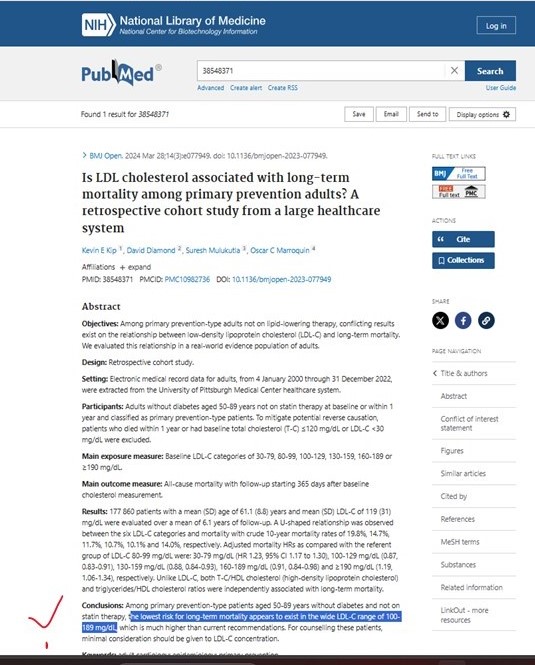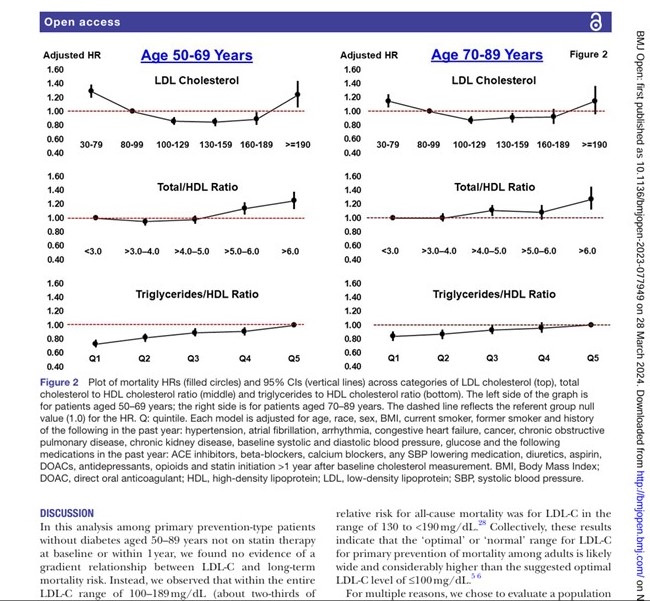"Uncover the truth behind the groundbreaking discovery of the causes of the world's biggest problems. 'The Root Causes' will change how you view the world!"
Cholesterol Study Insights
Exploring the link between LDL cholesterol levels and mortality rates for better health outcomes.
Understanding LDL Cholesterol and Mortality
This study analyzed the relationship between low-density lipoprotein cholesterol (LDL-C) levels and long-term mortality in adults aged 50-89 years without diabetes and not on statin therapy. The analysis revealed a U-shaped relationship between LDL-C levels and all-cause mortality. The lowest risk for long-term mortality was observed in individuals with LDL-C levels between 100–189 mg/dL. Specifically, those with LDL-C in this range had a lower mortality risk compared to both lower (<80 mg/dL) and higher (>190 mg/dL) LDL-C levels. The findings suggest that for primary prevention in adults, LDL-C concentrations between 100–189 mg/dL are associated with the lowest mortality risk, contrary to current guidelines that recommend aiming for lower LDL-C levels.




Cholesterol Study - Higher "Bad Cholesterol" Level, The Longer You Live (100 -189 mg/dL)
Exploring LDL cholesterol's impact on mortality rates and health.
Introduction
Recent research has delved into the complex interactions between low-density lipoprotein cholesterol (LDL-C) levels and long-term mortality among adults aged 50 to 89 years. This study specifically focused on individuals without diabetes and those not undergoing statin therapy. By analyzing the data, it was found that LDL-C levels significantly correlated with all-cause mortality, revealing a noteworthy U-shaped relationship.
The U-Shaped Curve of LDL-C and Mortality Risk
The findings of this analysis indicated that the risk of mortality is not linear with respect to LDL-C levels. Instead, it presents a U-shaped curve: individuals exhibiting LDL-C levels between 100 and 189 mg/dl were at the lowest risk for long-term mortality. This suggests that moderate levels of LDL-C may afford a protective effect against premature death.
In contrast, lower levels of LDL-C, particularly those below 80 mg/dl, were associated with an increased risk of mortality. Likewise, elevated LDL-C levels exceeding 190 mg/dl also correlated with higher mortality risks. This poses critical implications for clinical practice and the management of cholesterol levels in older adults.
Implications for Primary Prevention
These findings suggest that the typical recommendations for LDL-C management may need reevaluation, especially for adults aged 50 years and above. While it has been a common belief that lower LDL-C levels are universally beneficial, this study challenges that notion. For primary prevention in older adults, maintaining LDL-C concentrations between 100 and 189 mg/dl appears to be most favorable, effectively balancing the need to minimize cardiovascular risk while avoiding potential mortality threats associated with extremely low or high LDL-C levels.
Healthcare providers should, therefore, consider these nuanced relationships when designing cholesterol-lowering strategies for their older patients. It is crucial to individualize treatment plans that account for a patient’s unique health profile, particularly focusing on achieving optimal LDL-C levels that align with the findings of this study.
Conclusion
The analysis of LDL-C levels and all-cause mortality among older adults has illuminated an essential aspect of primary preventative health. With a U-shaped relationship identified, the importance of maintaining LDL-C levels within a specific range could help to lower long-term mortality risk. Future research should continue to explore these dynamics to further elucidate how best to balance LDL-C levels with overall health outcomes for aging populations.
Health Impact Study
This project investigates the correlation between LDL cholesterol levels and mortality, aiming to provide insights into health risks associated with cholesterol management and its implications for public health strategies.
Mortality Research
Our research focuses on understanding how LDL cholesterol influences mortality, contributing to the body of knowledge that informs healthcare practices and preventive measures for better health outcomes.
Contact Us


For inquiries about our LDL cholesterol study and its relation to mortality, please reach out to us.
It’s truly surprising and fascinating to learn that recent studies suggest higher cholesterol levels might actually be linked to longer life! For years, we’ve been told that cholesterol, especially LDL, is the main culprit behind heart disease and early death. But new research challenges this long-held belief. It turns out, higher cholesterol may be protective, especially in older adults. This completely shifts our understanding of cardiovascular health, suggesting that the focus on lowering cholesterol with statins might not be as critical as once thought. It’s amazing how these findings could reshape decades of medical advice!
Joseph Magpuyo


★★★★★
Health
Understanding illness to empower your well-being journey.
Wellness
Knowledge
info@rootcauseprevention.com
903-268-6664
© 2024. All rights reserved.
grfv@sbcgloal.net